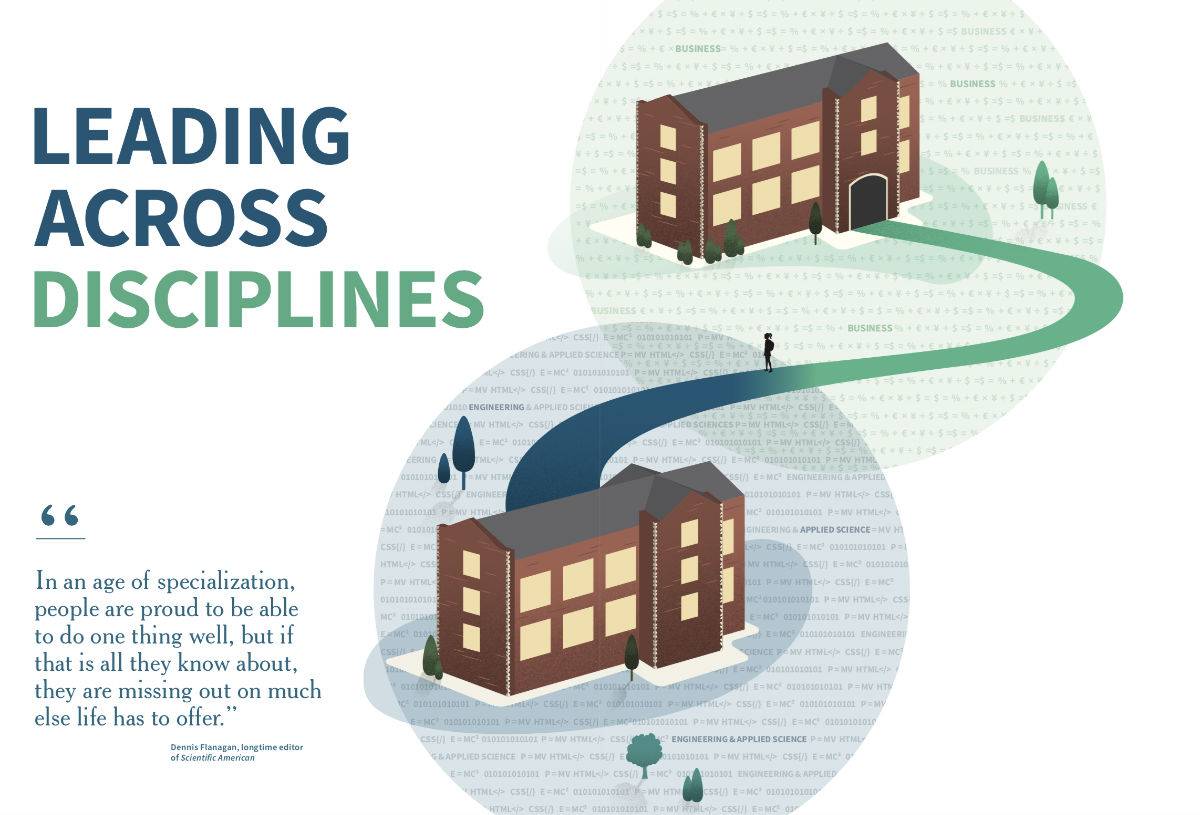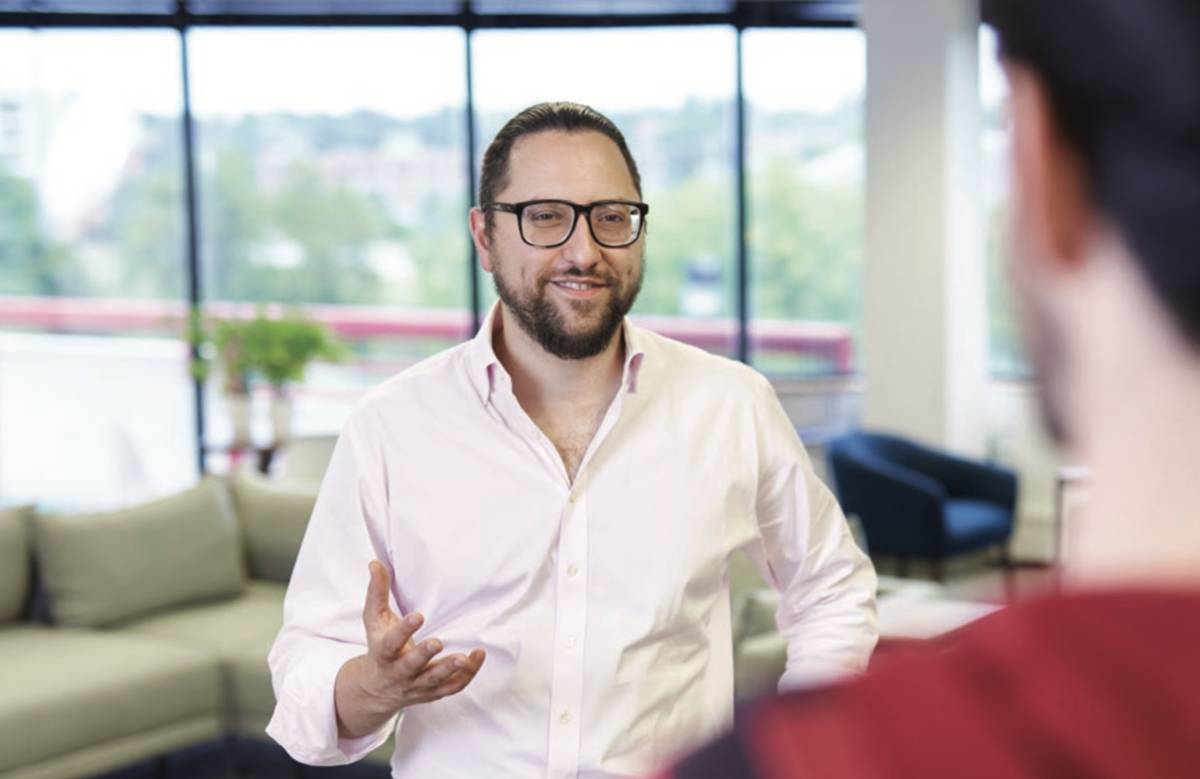Olin’s out-of-the-box approach to business education
- December 28, 2018
- By Guest Author
- 6 minute read

When David Karandish was a WashU engineering undergraduate, he didn’t think his computer science major would give him everything he needed for the career he planned.
He also wanted to learn something about business—especially entrepreneurship.
By Jean Dubail, originally published in the 2018 edition of Olin Business magazine.
As a double major in two different colleges, Karandish’s academic choices presented a challenge, even for someone of his considerable determination.
“There wasn’t a lot of overlap,” said Karandish, BSCS 2005, who added a second major in entrepreneurship at Olin. “You had to really carve out your schedule to make that work.”
After graduation, he founded or ran a string of tech-oriented startups, including Answers.com. He recently founded Jane.ai, an artificial intelligence application he likens to Siri or Alexa for the workplace.

Having run several of his own businesses, Karandish is more convinced than ever of the value of melding computer skills with business acumen. Software engineers can benefit, for example, by knowing something about how the product will be marketed.
“I think it would be awesome if engineers came out of school somewhat more business-minded,” he said. There is, he added, “a big opportunity to break down between silos.”
Meeting a need in the marketplace
That’s exactly the purpose of a new initiative from Olin Business School and the School of Engineering & Applied Science: a joint degree program, the first such degree Washington University will offer.
The new bachelor of science in business and computer science will allow Olin students to hone their tech skills through the engineering school while encouraging computer science students to improve their business chops through Olin.
“We’ve worked for a year to put this together, and we’ve validated our thinking off of other alumni and corporate partners,” said Steve Malter, Olin’s senior associate dean of undergraduate programs. “This is what the workforce is looking for. This is the future.”
The program’s architects are confident demand for its future graduates will be strong.
“We know there is a lot of need for these types of positions—someone who can use both disciplines, the engineers as well as the analytics and strategy,” Malter said.
What WashU educators have done, however, is not merely add the core requirements from one school to those of the other. Instead, faculty and administrators from both schools selected certain courses from each discipline to tailor a unique mix for the new degree.
Chris Kroeger, associate dean of the engineering school, gave a tongue-in-cheek description of the process of drafting the joint curriculum. “We totally threw all the requirements up in the air,” he said. “With the faculty from both schools, and insightful feedback from alums, we picked up the ones that made the most sense for the objectives of this program.”
Kroeger described the resulting core curriculum as a “hybrid” of the separate business and computing programs. Malter agreed. “It’s not two programs shoved together. The two faculties will be working together to deliver the material.”
Officials in the provost’s office, whose blessing was needed to advance the program, were impressed by the way faculty and administrators from the two schools collaborated to create something unique.
“It was very thoughtfully and intentionally put together,” said Associate Provost Erin Culbreth, adding that the combination of business and computer skills is “kind of a great match. Anything in the tech industry is super-hot.”
Some program details are still in development, but the new joint program will be first offered in fall 2019 and will, include extracurricular work such as a capstone program, a visit to Silicon Valley, and an internship in the startup technology space.
“This is definitely a real differentiator,” Malter said. “There will be experiences that are unique to this new degree.”
Building interdisciplinary expertise
The new joint degree won’t be the first interdisciplinary program at Olin, where Dean Mark Taylor has encouraged approaching business education from different perspectives—aligning with several pillars of the school’s strategic plan, including innovation and a global focus.
For example, in 2017-18, Olin began offering a minor in the business of social impact.
The new program was the brainchild of a group of students who pitched it to Olin faculty and administrators after conducting a survey of their peers and reviewing similar programs at other institutions. They aimed to bring an ethical dimension into business decision-making and to foster the use of market-based techniques to address social problems, particularly in the nonprofit sector.
Heather Cameron, hired in 2016 by the Brown School of Social Work and installed as the Michael B. Kaufman Professor of Practice for Social Entrepreneurship and Innovation, was asked to take the lead in creating the new program. Cameron, who also holds a courtesy appointment at Olin, designed several new courses, several of which she herself taught during the program’s first year.
“There is an increasing focus on using market-based tools to address social problems,” Cameron said. “Students want to use their business training to work with government and civil society actors to address social and environmental challenges.”
Offerings for the social impact minor include Olin School classes in “Not-for-Profit Accounting” and “Ethical Issues in Decision-Making,” along with classes from other schools in architecture, urban studies, political science, and environmental studies.
Among the classes Cameron has taught as part of the new minor was “Social Entrepreneurship,” where Shivakshi Rana, MBA 2018, served as a teaching assistant. For many of the students, Rana said, the class marked a departure from their usual studies in one discipline.
“This was the first time in school they were able to branch out from the regular business or arts and sciences curriculum,” Rana said. “There was a definite sense of enthusiasm and excitement.”
New perspectives on business
Among the students was bioengineering major Grace Tedder, BSBME ’20. She said she took Social Entrepreneurship partly to escape the isolation she sometimes feels in the engineering school, but mostly because she had become interested in the subject after reading a book on it in high school.
‘The class broadened my ideas about methods we can use to create social change, and allowed me to explore different challenges and approaches in social enterprises, nonprofits, and other forms of social entrepreneurship,” Tedder said.
Tedder got first-hand experience with that type of work while participating in the Madagascar Sustainability Initiative through Olin’s Center for Experiential Learning. She was part of a team that worked with a local carpenter to build a solar dehydrator to preserve produce—and also taught local women how to pickle.
Drawing from those experiences, she is considering working in the medical devices field after graduation. “Having that kind of crossover could really help,” she said.
Business major Michael Kramer, BSBA 2018, MSCA 2019, took the Social Impact class partly to learn how business principles could be brought to bear on nonprofit social enterprises like the Special Olympics, where he had long been active.
Cameron’s class “provided the perspective to stop evaluating social enterprises as donation-seekers and (instead) as potentially scalable businesses,” Kramer said.
Olin also offers several other minors, which, while not strictly speaking “interdisciplinary,” provide new perspectives on business for somewhat “nontraditional” business students.
They include a minor in the business of entertainment, led by Glenn MacDonald, the John M. Olin Distinguished Professor of Economics and Strategy. The minor is designed to appeal to two groups of students—Olin students thinking about working in the entertainment field, and students from the creative disciplines who want to make their artistic pursuits economically sustainable.
“The courses are full of actors and singers and artists,” MacDonald said. “We’re going to teach you how to run a little business, how to eat, how to protect your intellectual property, how to do things like licensing, how to deal with galleries and managers.”
All these efforts, and particularly the new joint degree, have the same general aim: to make Olin students as well-rounded—and employable—as possible in an age of increasing specialization.
“It will be very obvious, the value it’s going to have,” Kroeger said. “We believe there will be strong interest.”
BUSINESS WITH A TWIST
Several Olin programs meld different disciplines with business principles for a nontraditional b-school education.
- Bachelor of science in business and computer science. Coming fall 2019. WashU’s first true joint degree program, through both Olin and the School of Engineering and Applied Science.
- Minor in the business of sports. Begun fall 2014. Launched with a $1 million gift from Joseph S. Lacob, co-executive chairman and CEO of the NBA’s Golden State Warriors.
- Minor in the business of entertainment. Begun March 2016. Students are required to take three of their 15 units outside of Olin.
- Minor in the business of social impact. Begun fall 2017. Offered jointly through Olin and the Brown School of Social Work.
- Minor in the business of the arts. Tentatively coming spring 2019. Made possible with a $1 million gift by Richard Ritholz, BSBA ’84, an equity partner at New York City-based hedge fund Elliott Management Corporation, and his wife Linda.
Media inquiries
For assistance with media inquiries and to find faculty experts, please contact Washington University Marketing & Communications.
Monday–Friday, 8:30 to 5 p.m.
Sara Savat
Senior News Director, Business and Social Sciences
